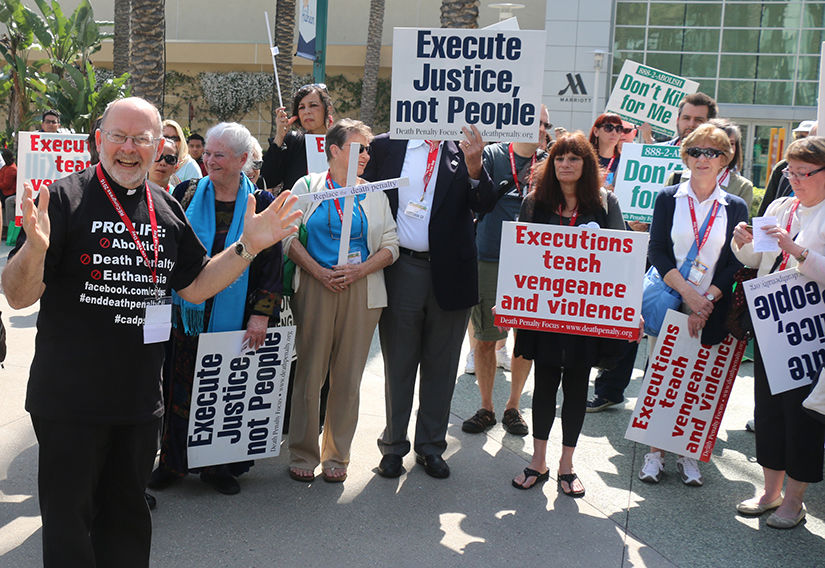Father Chris Ponnet found himself grieving after the election. Not over candidate results, but for seeing his years of work to end the death penalty in California fall short again.
Father Ponnet has worked passionately for over 30 years to abolish the death penalty. His motivation comes from a pastoral sense of working with victims and perpetrators, as well as his faith in Church teaching that leads him to his consistent life ethic. He is part of Catholics Against the Death Penalty, a group that has been meeting monthly for the past four years preparing to bring death penalty abolition to the ballot.
On Nov. 8, voters rejected Prop. 62, voting keep the death penalty. They voted at a higher clip in favor of Prop. 66, an opposing initiative aimed shortening the process of carrying out the death penalty.
“Election night was a disappointment on two grounds,” Father Ponnet said. “One, we lost on ending the death penalty, but second, we lost on Prop. 66 which will just make it even worse.”
Father Ponnet feels Prop. 66 offers families and victims false hope for closure and healing by promising that inmates won’t be not on death row for more than five years.
“Working with families I find they don’t get closure when someone is executed,” Father Ponnet said. He added that when families wait 10, 20, 30 years for it to happen, they are forced to remain in a place of anger the whole time, unable to heal and move on with life.
He also doesn’t believe that Prop. 66 can actually be implemented.
Father Ponnet noted that the Catholic Conference of California Bishops and Archbishop José H. Gomez did a good job of putting out statements on Prop. 62, but feels there are several reasons why it fell short.
One reason is that many Catholics acted as single issue voters, voting against abortion, according to Father Ponnet. “We found there was a disconnect amongst many Catholics who are against abortion,” he said. “They would often say ‘Father, I’m sorry, I’m just not with the bishops on this and can’t support ending the death penalty,’” he added, noting that not even the potential of executing an innocent person was enough to sway many of these people.
He observed that Catholics voting for Donald Trump to oppose abortion were also voting for a candidate in favor of the death penalty and the use of torture. “I think we’re at time when, based on what came out nationally and locally [in the voting results], that mercy is not as high a priority as other things,” he said.
“My prayer and hope is that we as a Church embrace consistent life ethics. Often in parishes when I speak about social justice and the death penalty people say ‘We never hear about this, we only hear about abortion.’ It is up to us as a global Church to really begin embracing the fullness of the respect life position,” Father Ponnet said, adding that “we have a lot more teaching to do as a Church.”
“I have hopes we will continue working on this nationally as well as in California, but also a crucial part of our Catholic voice is to remember that anyone, including those on death row, are human beings, and we don’t have any right, physically or empirically, to kill them,” he said.
The next test for the death penalty, he noted, will come at the U.S. Supreme Court. For Father Ponnet, the struggle goes on.
Not all was bleak on election night as Prop. 57, the Public Safety and Rehabilitation Act of 2016, was approved by voters. While it aims to reduce prison overcrowding, Prop. 57 allows non-violent offenders a chance at rehabilitation and education to earn credits towards an earlier parole.
Bobby Garcia was incarcerated at 16 after being tried as an adult and served 21 years in prison. After parole in 2014 he began working with the Los Angeles Archdiocese’s Office of Restorative Justice.
“I’m seeing California is now on a path of restorative justice, giving people second chances,” Garcia said. “This is a not a get out of jail free proposition. This one where you have to earn it. You earn it through participation in self-help groups, education, anything that has to do with transforming your life.”
Garcia noted many inmates are waiting for an opportunity like this, working to change their lives but receiving no credit for that work. “This is really a blessing because now they get rewarded by getting out sooner, whereas before they were just doing it for their own spiritual journey. Now they are actually going to get something in return,” Garcia said.
Prop. 57 will reduce recidivism, he said, because it strengthens the success of parole, with inmates receiving treatment, education and experience towards developing a vocational career.
Reflecting on the passage of Prop 57 but the rejection of Prop 62, Garcia observed, “Everything, I think, is just coming in gradual steps.”
California voters also approved Prop 64 to legalize recreational marijuana, reflecting what appears to be a trending nationwide change in attitude towards pot. The California bishops and others had put out statements highlighting potential dangers of marijuana to young people and the poor. Similar measures were also passed in Massachusetts and Nevada, bringing the number of states with legalized marijuana use to seven, along with Washington DC.

